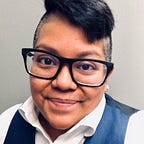2017 NASPA Region I Ubuntu Welcome Address
Good Morning!
I have been waiting for two years for this moment and exhilarated that it is finally here. I wanted to give a little context as to why and how this happened. Last year at Region I, I had the opportunity to hold a conversation with former regional directors of NASPA region I, including Pauline Dobrowski, Rich DeCapua, Brian McCoy and Sheila Murphey along with the President of NASPA, Kevin Kruger and including our Ubuntu VPSA and Faculty representatives, Jacinda Felix Haro and Raul Fernandez. In that meeting we talked about creating a pathway for leaders of color in the region because despite efforts, we had never had a conference committee chair or regional director of color. We talked about the fact that many of the leaders in the region were white. We talked about some of the barriers and difficulties that people of color were facing. At some point I was asked a question, “Julia, how have you been able to break through as a leader? Why are you successful? ” I thought long and hard about this question even up until a few weeks ago I was not quite sure how to answer it. Then I thought about who I was as a leader and my personal narrative and here is my answer, and four important points:
I credit my STRENGTH:
I am Latinx, queer, transracial adoptee from Tegucigalpa, Honduras. At six months I would be adopted and brought up in a white family in a 93% white neighborhood. While I was encouraged to talk about my adoption, no one knew how to teach me or talk to me about my race or culture. I remember in 1st grade starting to question teachers, and in 3rd grade learning about the civil rights movements and asking hard questions about racism and asking my white parents, “What did you do to stop white people being mean to black people in the 60’s” My parents were not ready. To be a person of color in this world is not easy and we know that. To not be equipped with the tools and ability to navigate this world as a person of color is painful and I would not learn to talk about my own race or self- identity until age 25 when I took a trip to my home country to finally realize, I was and always had been enough. Strength was in the hot sun that beamed on me the day I arrived in Honduras and it was the humid air that instantly made my straight heavy hair, curl, and strength was in the lush green mountains that surrounded me as I attempted to speak Spanish for the first time in my home country. That strength has been with me since.
I refer to my RESILENCY:
I silenced the queer part of myself for five years, and would stay closeted for a full seven years. If I had one word to describe my time before 18 years old, it would be the word, lonely. Quite frankly it’s embarrassing to talk about how alone I truly was, but it was in college that I would learn how to take that energy of loneliness and use it to fuel my creativity and passion for change. Once I became a student leader and highlighted others I knew my mission in life would be to never allow for others to feel alone as I had once felt. What a privilege and honor it has been working with the LGBTQIA+ community. Our community specifically the TQPOC community’s foundation is built upon resiliency as we will always remind others that we have been here no matter how many times history tries to erase our story.
I look within to find AUTHENTICITY:
Once you find your voice it is the most powerful tool you will ever have. People will never be able to shake you, ignore you, defy you or question your existance. Once you see yourself you can begin to see others and connect and create community. We are here because of the people who came before us. Those people didn’t always have the privilege to be their authentic selves but they paved the way so we could be, authentic.
Lastly, I lead through EMPOWERMENT:
I will always want to give others what I was given. After attending several institutes I could not help but think, why did I have an opportunity to attend an institute that supported some of my identities and others were not given an opportunity at all? Empowerment is bringing twelve other people of color as advocates, together, knowing they will be digging deep today so that you all can have the opportunity to connect, inspire, educate and build community with one another because we are stronger together.
Strength, Resilency, Authenticity, and Empowerment those are the four pillars of this institute. Ubuntu, a word that intends to connect a single person to a community, to humanity. I am who I am because of who we all are. To answer the original question, this. This is how I broke through in leadership. I looked to all of you knowing you would see me and build this institute with me.
Thank you.
— —
The NASPA Region I Ubuntu Institute was held on November 12, 2017. 43 partipants who self identified as African American/African/Black, Latinx/a/o, Asian Pacific Islander, Trans/Non-binary Queer People of color and Multiracial and Transracial were present. This was the inaugural institute, and we are still reflecting but one thing is known for sure, there are many more people and identities to honor at the next Ubuntu Institute.
In Solidarity,
Julia R. Golden-Battle, Director of the Ubuntu Institute
